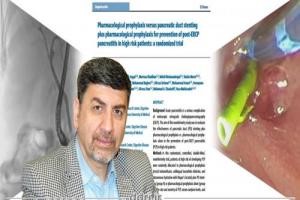The researchers of the Digestive Diseases Research Institute proved for the first time in the world
The possibility of prophylaxis of acute pancreatitis in ERCP without pancreatic duct stenting

The researchers of the Digestive Diseases Research Institute of Tehran University of Medical Science, in a study proved for the first time in the world that Pharmacological prophylaxis of acute pancreatitis in ERCP alone is sufficient and does not require "pancreatic duct stenting with Pharmacological prophylaxis " in patients at risk
Writer: Fereshteh Hashemi
According to the Digestive Diseases Research Institute of Tehran University of Medical Science, the researchers' study "Pharmacological prophylaxis versus pancreatic duct stenting plus pharmacological prophylaxis for prevention of post-ERCP pancreatitis in high-risk patients: a randomized trial" which is published in the Journal of Endoscopy, has presented this new finding while acute pancreatitis is one of the possible but very serious complications of "ERCP".
ERCP is a diagnostic and therapeutic method used to remove common bile duct stones and pancreatic duct stones, and dilate benign and malignant common bile duct and pancreatic duct stenosis.
According to the estimates by the World Association of Gastroenterologists and Hepatologists, 5 to 10 percent of ERCP cases lead to serious complications such as pancreatitis, hemorrhage, inflammation or infection of biliary tract (cholangitis), and rupture of the bowel or bile duct.
The study by the researchers of the Digestive Diseases Research Institute of Tehran University of Medical Science, which is a "randomized clinical trial", was conducted on 414 patients (60% female and 40% male) aged 17 to 60 years at high risk of acute pancreatitis (at least one or two risk factors) referred to Shariati Hospital in Tehran and were under continuous treatment. The samples were followed for 21 months.
Professor Rasool Sotoudeh Manesh, a gastroenterologist and hepatologist and the attending professor at Tehran University of Medical Science, who is the main study leader , said about the results: In this study, drug prophylaxis of acute pancreatitis after ERCP in high-risk patients in both groups was done by administering 100 mg Indomethacin rectal suppository, 5 mg Isosorbide dinitrate sublingual tablet and Ringer Lactate serum.
The professor of the Digestive Diseases Research Institute mentioned that the results of the present study suggest that the effects of drug prophylaxis in the prevention of post-ERCP acute pancreatitis are comparable to "stenting with drug prophylaxis" in patients. However, more extensive studies are needed to confirm the results of this study.
The faculty member of Tehran University of Medical Sciences noted: To date, numerous studies have supported the benefits of pancreatic duct stenting for the prevention of post-ERCP acute pancreatitis, but these studies were designed before any pharmacological measures were available. In fact, no comparison has been made between pancreatic stenting with prophylactic drugs.
The gastroenterologist and hepatologist also emphasized that failure in pancreatic duct stenting can lead to worse complications for patients compared with those who did not undergo stenting and the inflammation of pancreas after ERCP was prevented in a purely pharmacological manner.
The professor of the Digestive Diseases Research Institute of Tehran University of Medical Science said that despite the effectiveness of pancreatic duct stenting for the prevention of acute pancreatitis, this method is challenging; one of these challenges is not properly positioning the stent in the pancreatic duct by the physician and not fixing it in place due to spontaneous displacement of the stent.
This serious complication of ERCP, in addition to counteracting the beneficial effects of the stent, requires re-endoscopy for removing the stent and sometimes needs surgical intervention in the event of failure to remove the stent by endoscopy, and ultimately increases the risk of acute pancreatitis. In addition, stent removal requires the re-ERCP and imposition of additional costs on the patients.
He described the method of preventing acute pancreatitis after ERCP by using medicines as a simple, safe, effective, minimally restricted, and uncomplicated method in high-risk groups and emphasized doing so compared to stenting.
comment